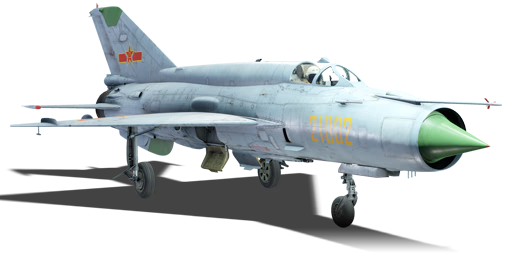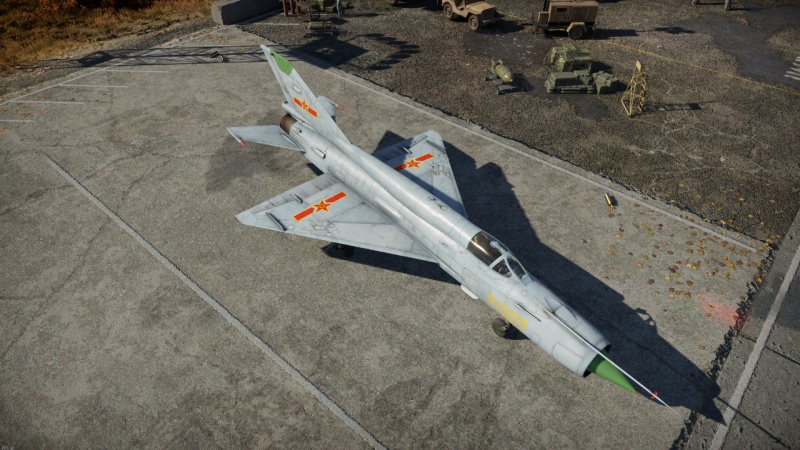J-7D
Contents
Description
The J-7D(Chinese: 歼-7D, previously J-7IIIA; unified NATO codename: Fishcan) is a premium gift rank VII Chinese jet fighter with a battle rating of 10.7 (AB), 11.0 (RB), and 11.3 (SB). It was introduced in Update "Apex Predators".
The reverse-engineered version of MiG-21MF from Egypt for all-weather operations; J-7D offers very similar performance to late MiG-21 series with better engine and higher fuel capacity. While it lacks SARH missiles for head-on/interception missions and large-caliber rockets like S-24, the overall combat capabilities can be still ensured by its IR AAMs and varieties of Chinese ground-attack weaponries.
General info
Flight performance
Taking a look at J-7D, other than its default grey-tone camo and the PLAAF roundel onboard, the jet itself looks extremely similar to late MiG-21 series with R-13F-300 engines. This is indeed true as J-7III series (C and D) were both based on MiG-21MFs exchanged from Egypt; in short words, J-7D flies very similarly to MiG-21MF in LSK (East Germany) service. In a more detailed manner, the later variants of Fishbed featured higher fuel capacity (the “spine” are installed with fuel tanks) and higher engine thrust, as well as featuring a new RP-22 radar; J-7D featured all the aforementioned upgrades. The lighter weight and higher thrust of the WP-13F1 engine also ensure a faster speed even against a MiG-21Bis while having slightly better maneuverability to it as well; do remember that J-7D is still an interceptor after all, so in most cases utilize its speed is more than enough to take out enemies at its tier. But do beware light fighters or tailless delta jets in one-on-one dogfight, it's better to quit the fight and wait for better chance to take them down in one-take.
| Characteristics | Max speed (km/h at _,___ m) |
Max altitude (metres) |
Turn time (seconds) |
Rate of climb (metres/second) |
Take-off run (metres) | |||
|---|---|---|---|---|---|---|---|---|
| AB | RB | AB | RB | AB | RB | |||
| Stock | ___ | ___ | 16000 | __._ | __._ | __._ | __._ | ___ |
| Upgraded | ___ | ___ | __._ | __._ | __._ | __._ | ||
Details
| Features | |||||
|---|---|---|---|---|---|
| Combat flaps | Take-off flaps | Landing flaps | Air brakes | Arrestor gear | Drogue chute |
| _ | _ | _ | _ | _ | _ |
| Limits | ||||||
|---|---|---|---|---|---|---|
| Wings (km/h) | Gear (km/h) | Flaps (km/h) | Max Static G | |||
| Combat | Take-off | Landing | + | - | ||
| 1365 | 700 | ___ | ___ | ___ | ~__ | ~__ |
| Optimal velocities (km/h) | |||
|---|---|---|---|
| Ailerons | Rudder | Elevators | Radiator |
| < ___ | < ___ | < ___ | N/A |
Engine performance
| Engine | Aircraft mass | |||||
|---|---|---|---|---|---|---|
| Engine name | Number | Basic mass | Wing loading (full fuel) | |||
| _____ | _ | _,___ kg | ___ kg/m2 | |||
| Engine characteristics | Mass with fuel (no weapons load) | Max Gross Weight | ||||
| Weight (each) | Type | _m fuel | __m fuel | __m fuel | ||
| ___ kg | ___ | _,___ kg | _,___ kg | _,___ kg | _,___ kg | |
| Maximum engine thrust @ 0 m (RB/SB) | Thrust to weight ratio @ 0 m (___%/WEP) | |||||
| Condition | 100% | ___%/WEP | _m fuel | __m fuel | __m fuel | MGW |
| Stationary | ___ kgf | ___ kgf | _.__ | _.__ | _.__ | _.__ |
| Optimal | ___ kgf (_ km/h) |
___ kgf (_ km/h) |
_.__ | _.__ | _.__ | _.__ |
Survivability and armour
A bad news for players who fly J-7D is that, other than the airframe and aluminum alloy skin, the jet has no additional protection at any given spots; any hits from enemy weapons are very likely to either severely damage the jet or take out the pilot straight away. But EFS system and self-sealing tanks do present onboard, giving it some chance to return to airfield if it survived subsequence assaults from enemies.
Modifications and economy
Armaments
Offensive armament
The J-7D is armed with:
- A choice between two presets:
- 1 x 23 mm Type 23-3 cannon, belly-mounted (200 rpg)
- 1 x 23 mm Type 23-3 cannon + 72 x countermeasures
Suspended armament
Describe the aircraft's suspended armament: additional cannons under the wings, bombs, rockets and torpedoes. This section is especially important for bombers and attackers. If there is no suspended weaponry remove this subsection.
Usage in battles
Describe the tactics of playing in the aircraft, the features of using aircraft in a team and advice on tactics. Refrain from creating a "guide" - do not impose a single point of view, but instead, give the reader food for thought. Examine the most dangerous enemies and give recommendations on fighting them. If necessary, note the specifics of the game in different modes (AB, RB, SB).
Pros and cons
Pros:
- Better engine thrust than most previous J-7/MiG-21 series thanks to the WP-13F1 engine
- Access to search radar
- Relatively better rocket options to Soviet MiG-21MF/S series
- Devastating PL-5B or PL-7 missiles at its disposal for different playstyle
- Built-in countermeasures with 72 salvos, unlike its Soviet cousins
Cons:
- Bleeds severely at maneuvers due to delta wing design
- Heavier than J-7E, players have to adopt different doctrine
- Lacks all-aspect missiles and SARH missiles unlike its Soviet cousins
- Below average pylon counts for its tier
History
As the Type 62 and the subsequence J-7I/II series went into commission with PLAAF in late 1960s, PLAAF has already sought for a new fighter for all-weather interception and replacing earlier jets in service; although the J-8 program has also been started by the same time, it was until 1979 when J-7II was finalized and J-8I was passed for certification. This also called for a back-up for the J-8I series. During the late 1970s economy reform and increasing international arms trade with foreign countries, Chinese engineers visited countries with MiG-21MF in-service and took the design for future use; CATIC also exchanged some Soviet equipment from Egypt including MiG-23SM and MiG-21MF as the reverse-engineer subject for new interceptors.
The new J-7III started its development in March 1979 by CAC and after 5 years of repairing MiG-21MF while building domestic prototypes, J-7III took its first flight on 1984/4/26 and subsequence flight tests continued until 1988 when the first batches rolled-off the production line; the reverse-engineered jet featured new engine and a domestic JL-7 radar based from Type 317A radar from the failed Q-5 Yi (强-5乙, perhaps the very last torpedo bomber ever developed) but engine production issues hindered the further production of J-7III (now called J-7C under new designation) with only 17 of them built. Meanwhile, as the J-7III continued to develop, CAC and GAIC worked on new electronical, countermeasure systems as well as new WP-13F1 engine for the new jet. The new jet, developed in 1988, featured a new JL-7A radar capable of launching the latest PL-8 missiles, reverse-engineered Marconi Type 956 HUD, as well as Type 930-4 countermeasure system. J-7IIIA (now called J-7D under new designation) took its first flight in mid-1991 and joined PLAAF in 1995.
Due to the different in combat doctrine, introduction of more advanced Su-27SK Flanker-B and J-7E, as well as J-8II series being combat-capable in 1990s and the successful development of Project No. 10 (J-10), the need for J-7D deemed unnecessary and only 39 of them were built until 1999 as the placeholder for new jets; these jets made it into its first and only appearance in National Day parade of 1999, alongside with Flankers and air-refuel-capable J-8D.
Media
Excellent additions to the article would be video guides, screenshots from the game, and photos.
See also
Links to the articles on the War Thunder Wiki that you think will be useful for the reader, for example:
- reference to the series of the aircraft;
- links to approximate analogues of other nations and research trees.
External links
Paste links to sources and external resources, such as:
- topic on the official game forum;
- other literature.
| China jet aircraft | |
|---|---|
| Fighters | J-2 · J-4 · J-6A · J-7II · J-7D · J-7E · J-8B · J-8F · J-10A · J-11 · J-11A |
| Strike aircraft | Q-5 early · Q-5A · Q-5L · JH-7A |
| Bombers | H-5 |
| France | ␗Mirage 2000-5Ei |
| USA | ␗F-84G-21-RE · ␗F-84G-31-RE · ␗F-86F-30 · ␗F-86F-40 · ␗F-100A · ␗F-100F · ␗F-104A · ␗F-104G · ␗F-5A · ␗F-5E · ␗F-16A MLU |
| USSR | ␗MiG-9 · ␗MiG-9 (l) |
| North Korea | Shenyang F-5 |
| Pakistan | A-5C · JF-17 |
| China premium aircraft | |
|---|---|
| Fighters | ␗A6M2 · D.510C · ␗F-47N-25-RE · H-81A-2 · Hawk III · ␗Ki-45 hei/tei · ␗Ki-84 ko · ␗P-51C-11-NT |
| Jet fighters | Shenyang F-5 · J-7D |
| Strike aircraft | A-5C · ␗F-84G-31-RE |





